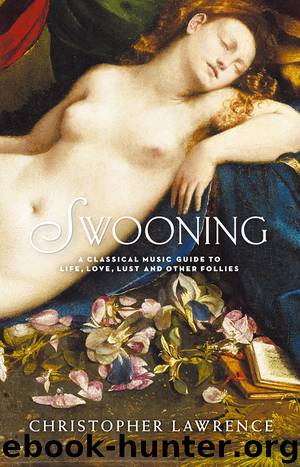Swooning by Lawrence Christopher;

Author:Lawrence, Christopher;
Language: eng
Format: epub
Publisher: Schwartz Publishing Pty. Ltd
SOME MUSICAL LIFE TIPS
‘The purpose of writing music? Simply a way to wake up to the very life we’re living.’
John Cage, 1957
1. DON’T WASTE A MOMENT
It’s tempting to imagine composers tinkering endlessly over their operas and symphonies. All that detail takes some fine-tuning. And all those notes! Leonardo da Vinci applied those never-quite-finishing touches to his diminutive Mona Lisa for nearly fifteen years. Surely an immense construct like Handel’s Messiah must have demanded a similar feat of endurance?
Well, no. Apparently it is easier to paint Jesus in sound than to paint a smile. In 1741 Handel composed Messiah end-to-end between 22 August and 14 September, just under three and a half weeks. He slowed to a canter with his next oratorio, Samson, which emerged from labour six weeks later on 29 October. Both occupy a very full evening in the hearing. I remember playing a four-minute chorus from his oratorio Israel in Egypt (the whole of which found its way to paper in just under the month of October 1738) and remarking that this elaborate piece probably took up most of a day’s work, right down to the viola’s last semi-quaver. One of Handel’s librettists, the Reverend Thomas Morell, might well have claimed a miracle had taken place when he delivered the text for an aria, ducked out of the room for a twinkle and returned three minutes later to find that Handel had already completed the vocal line.
Mozart was not only just as fast but could apparently do other things at the same time. In a twist on the ventriloquist who drinks water while his dummy talks, he wrote the overture to his opera Don Giovanni while quaffing punch and chatting with his wife the night before the opera’s premiere in 1787. Next time you’re browsing online at a site like imslp.org have a look at the overture in full score. It would take an ordinary human being more than a night just to copy it out. Mozart’s hand is faster than our eye.
The Italian composers of so-called bel canto in the early 1800s were the fastest baristas of music espresso. The opera world of those days was fast and loose with new pieces churning through provincial houses at an incredible rate. Composers would receive commissions a handful of weeks before opening night. A flop with the audience was met by an Italianate shrug of the shoulders; there was always another new piece due for performance in a month.
Rossini’s The Barber of Seville occupied him for just thirteen days in 1816, although sections of it (including its overture) were merely recycled from earlier failures. No sense in letting an audience’s disapproval kill good material, after all. Rossini’s compatriot Gaetano Donizetti knocked off his comedy classic The Elixir of Love (1832) in eight days.
Other composers were happier to substitute one big operatic egg with many smaller ones. Songs, for instance. Franz Schubert, Robert Schumann and Hugo Wolf, three of the greatest composers of German song (or lieder) in the nineteenth century, were like pigs in gravy if they could set several texts a day.
Download
This site does not store any files on its server. We only index and link to content provided by other sites. Please contact the content providers to delete copyright contents if any and email us, we'll remove relevant links or contents immediately.
The Goal (Off-Campus #4) by Elle Kennedy(12554)
Kathy Andrews Collection by Kathy Andrews(10612)
Diary of a Player by Brad Paisley(6888)
What Does This Button Do? by Bruce Dickinson(5564)
Assassin’s Fate by Robin Hobb(5288)
Big Little Lies by Liane Moriarty(4919)
Pale Blue Dot by Carl Sagan(4054)
Sticky Fingers by Joe Hagan(3474)
The Heroin Diaries by Nikki Sixx(2961)
The Death of the Heart by Elizabeth Bowen(2939)
Beneath These Shadows by Meghan March(2747)
The Help by Kathryn Stockett(2725)
Confessions of a Video Vixen by Karrine Steffans(2704)
How Music Works by David Byrne(2572)
Jam by Jam (epub)(2516)
Harry Potter 4 - Harry Potter and The Goblet of Fire by J.K.Rowling(2444)
Strange Fascination: David Bowie: The Definitive Story by David Buckley(2385)
Petty: The Biography by Warren Zanes(2255)
Darker Than the Deepest Sea by Trevor Dann(2232)
